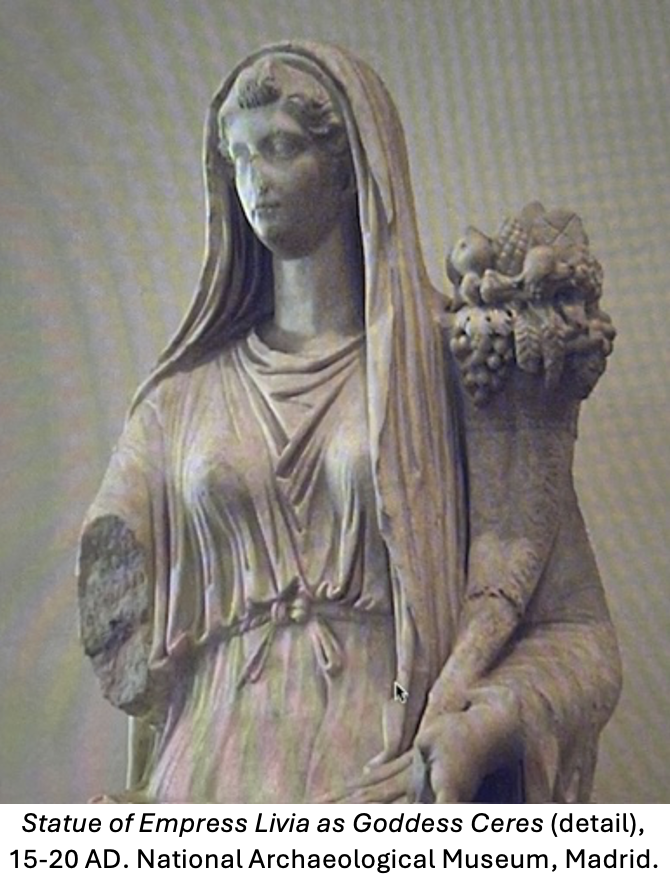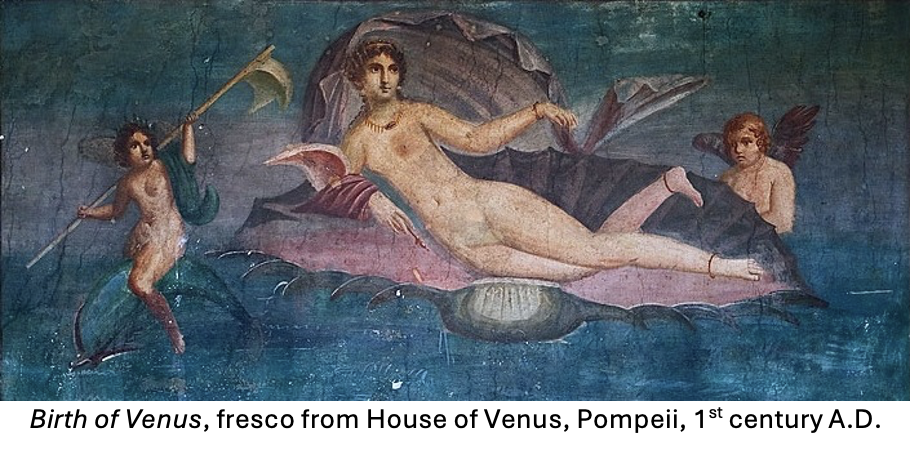DINING WITH THE GODS
Menu & Recipes
GUSTATIO ~ APPETIZERS
Bacchus’s Spiced Wine
Triptolemus’ Bread
Minerva’s Olive Relish with Feta Cheese
Proserpina’s Mixed Green Salad
MENSA PRIMA ~ MAIN COURSE
Venus’s Sea Scallops
Ceres’ Barley and Vegetable Porridge
Ulysses’ Lamb Chops
Diana’s Roasted Rabbit
Adonis’ Boar Sausages
MENSA SECUNDA ~ DESSERT
Polyphemus’ Cheesecake
Pomona’s Stewed Fruit
Baucis’ Dessert Platter
Minerva’s gift to mankind was the olive tree, besting Neptune’s offering of saltwater in an ancient gift-giving contest and resulting in the city of Athens being named after her Greek counterpoint, Athena. She was the goddess of war, wisdom, and arts and crafts, and also known to be an excellent weaver. In the Metamorphoses Book VI Ovid recounts the weaving contest between Minerva and Arachne: Minerva’s tapestry narrates her victory over Neptune with a gorgeous olive tree image and a border festooned with olive motifs.
Considering the nutritional value, deliciousness, and usefulness of olives and their oil, Minerva’s gift to mankind was a great one indeed. Victors at the Athenian games were rewarded decorative vases filled with olive oil from a sacred orchard outside Athens, and Greek colonists brought olive trees to southern Italy where that fruit and its oil have also become a dietary staple. As in ancient banquets, even today olives are standard fare as appetizers.
This recipe follow’s Cato’s recommendation for serving olives. (Cato.119, De agricultura)
INGREDIENTS:
1 cup (4oz/120g) Kalamata or Greek olives, pitted
1 cup (4oz/120g) ripe green Sicilian olives, pitted
2 tablespoons (.5oz/15g) red wine vinegar
¼ cup (1oz/30g) olive oil
1 tablespoon chopped fennel fronds (or finely chopped fennel root)
½ teaspoon ground cumin
2 teaspoons chopped fresh cilantro
1 tablespoon chopped fresh mint
½ pound chunk (225g) feta cheese, cut in slices
PROCEDURE:
1. Chop the olives roughly, place in a bowl; add olive oil, vinegar, fennel, herbs.
2. Stir, cover; allow flavors to mingle while resting, room temperature, at least half hour.
3. Uncover, toss; serve alongside a platter of sliced feta cheese and some bread.
Serves 4-6
Minerva’s Olive Relish with Feta Cheese
Ceres’ Barley and Vegetable Porridge
Ancients believed that Ceres, goddess of agriculture, caused the seasons by removing fertility during that period of the year that her daughter Proserpina was forced to spend in the Underworld with husband, Pluto. This story is told by Ovid in the Metamorphoses Book V. To make it through the dead winter months, the ancients learned to preserve certain fresh vegetables, grains and herbs by drying and storing them for later use.
The main course begins with this porridge recipe (Apicius 4.4.2), combining fresh and dried ingredients to celebrate the variety of Ceres’ production and maximizing of its availability.
INGREDIENTS:
½ cup (6oz/170g) canned or pre-soaked garbanzo beans
¼ cup (2oz/55g) each: dry lentils, split peas
1 cup (4oz/110g) barley flour (or barley roughly crushed in blender or food processor)
¼ cup (1oz/30g) olive oil
2 cups (5oz/140g) leeks, dark green parts removed, cleaned and finely chopped
2 tablespoons each: chopped cilantro, chopped dill
¼ cup (1oz/30g) fresh fennel bulb and fronds, finely chopped
1 cup (2oz/60g) each: beet greens, chard leaves, stems removed and finely chopped
2 cups (5oz/140g) cabbage, cored and finely chopped
1 tablespoon each: crushed fennel seed, crushed celery seed, dried oregano
Splash of fish sauce
4 cabbage leaves, finely chopped, for garnish
PROCEDURE:
1. Combine beans, lentils, split peas and barley flour in pot; cover with water by 3 inches.
2. Bring to boil; cook, stirring occasionally, 45-60 minutes or until thickened but soupy.
3. Place chopped vegetables, fresh herbs, oil in separate pan; sauté until softened.
4. Stir remaining dried herbs into vegetables; add to pot of thickened beans, lentils, peas.
5. Season with dash of fish sauce, additional drizzle of olive oil.
6. Ladle into individual soup bowls; garnish each with chopped cabbage leaves.
Serves 6-8
Venus’ Sea Scallops
Venus, goddess of love and beauty, was much beseeched in the ancient world by mortals wishing for her assistance in matters of the heart. In Book X of the Metamorphoses we encounter the sculptor Pygmalion who demonstrates how such a prayer can be expressed, and how such desire can be fulfilled.
According to ancient legend, Venus was born forth out of the sea, a fully formed woman atop a scallop shell. What more seductive and divine dish to honor this fairest of all goddesses than a delicious bite of scallops served forth on the shell? Here, this tasty morsel is accompanied by Apicius’ sweet and savory pine nut sauce (Apicius 7.1713), a precursor to the Italian agrodolce sauce. It is also fitting that this luscious shellfish is a known aphrodisiac.
INGREDIENTS:
¼ cup (1½oz/33g) pine nuts
¼ cup (2oz/60g) each: red wine vinegar, honey
Dash of fish sauce
Pinch of black pepper
¼ pound/110g sea scallops
2 tablespoons (1oz/30g) olive oil
PROCEDURE:
1. Toast pine nuts in a sauté pan on low heat until golden in color and lightly dry roasted.
2. Grind toasted nuts into an oily powder with mortar and pestle or food processor.
3. In a mixing bowl, combine ground pine nuts, honey, vinegar, fish sauce, pepper.
4. Whip with wire whisk or fork until well-blended; set aside.
5. Heat olive oil in a good frying pan until almost smoking; add scallops, sear 3 minutes.
6. Give the pan a good shake to move scallops around, then add pine nut sauce to the pan
for the final few minutes to warm through and flavor the scallops.
7. Place a few scallops each on 4 small serving plates (or ideally, scallop shells); serve hot
Serves 4
Pomona’s Stewed Fruit
The story of Pomona, wood nymph and keeper of fruit-bearing trees, found in Book XIV of the Metamorphoses, is one of the few myths of Roman origin in Ovid’s collection. The beautiful yet frigid protectress of a fragrant, fertile orchard is beseeched by suitor Vertumnus, in the guise of an old woman, to accept this young man’s courtship and allow love into her life. Fortunately, she accepts, and love ensues – one of the rare happy endings to an Ovid tale.
One can only imagine the joy of Vertumnus when granted open access to this orchard, tasting the bounty in such fruit-based dishes as this. (Apicius 4.4.4)
INGREDIENTS:
2 pounds (1kg) fresh, seasonal orchard fruit (pears, apples, peaches, apricots, quinces)
1½ cups (12oz/350ml) sweet white wine (or conditum)
1 tablespoon honey
½ teaspoon fish sauce
1 tablespoon vinegar
1 teaspoon dried mint
½ teaspoon each: black pepper and cumin, ground
PROCEDURE:
1. Cut fruit into quarters, removing any pits or cores; peel the fruit and set aside.
2. Put the sweet wine and honey in a wide saucepan; bring to a simmer.
3. Add fruit quarters to the pan; gently simmer them in this liquor, partially covered, about
8 minutes or until just cooked and still holding their shape.
4. Remove fruit with slotted spoon; set aside in a wide, shallow serving bowl.
5. Add mint, ground cumin, pepper to the pan; simmer liquid to reduce by one-third.
6. Flavor reduced liquor with fish sauce or salt, a bit at a time, until sweetness recedes.
7. Pour boiling liquor over fruit quarters, leave to cool; serve at room temperature.
Serves 4




